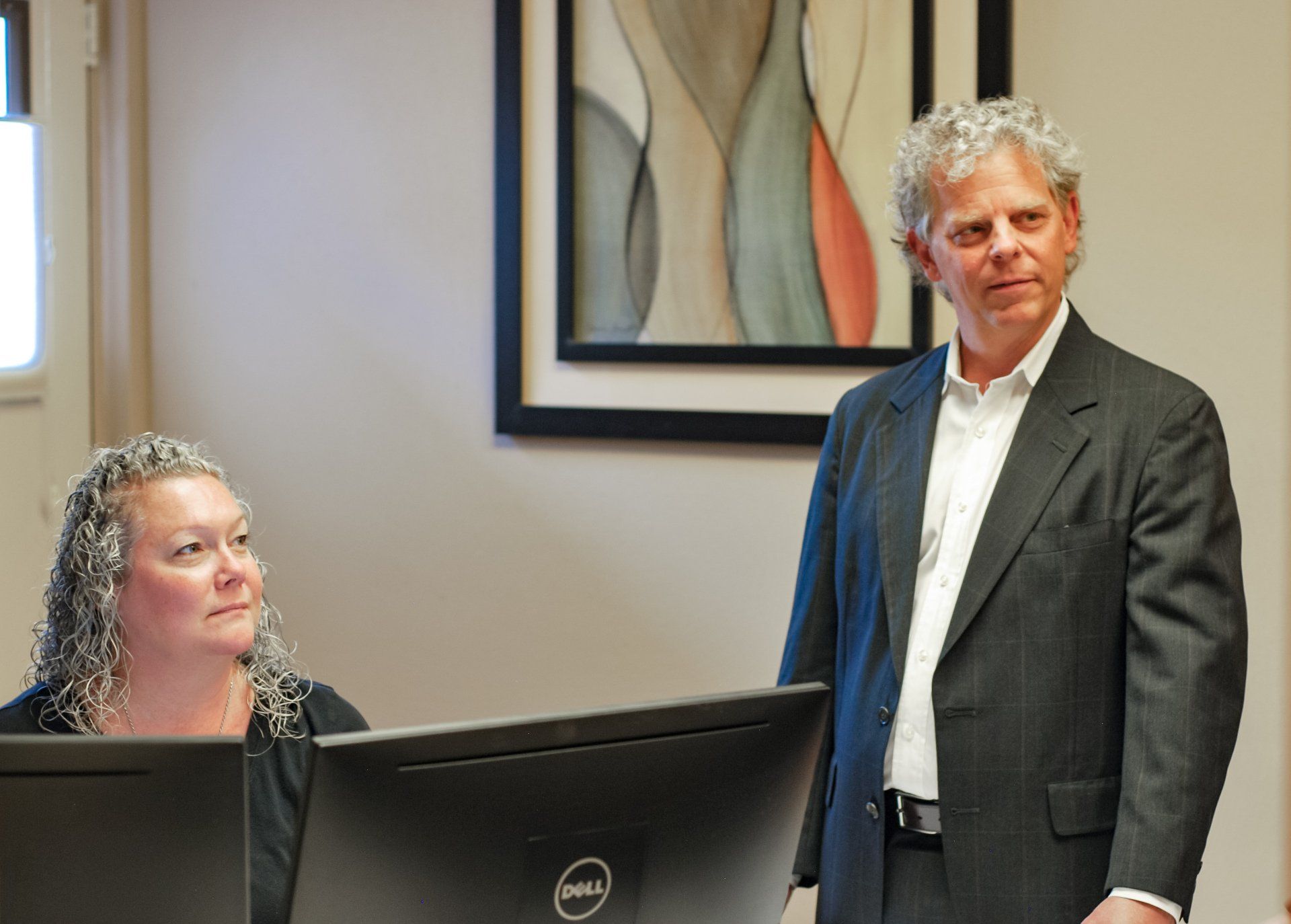Chapter 7 Bankruptcy Attorneys
Payment Plans Available
Low Legal Fees
FREE 1-Hour Bankruptcy Consultations
What is Chapter 7 Bankruptcy?

We help you fill out the bankruptcy documents. To do this we need some things. First and foremost, we need to know what bills you owe. We help you get a free credit report from www.annualcreditreport.com but we also need to know about things that you intend to keep like car loans, home loans, or debts to friends or family members.
There is also a requirement that you get a certificate saying that you received counseling from an independent agency about other options. To get this certificate, you go online and pay a minimal fee. Then you complete a short questionnaire and call in to talk to a counselor. They will then issue the certificate. You are free to file Chapter 7, even if the counselor finds other options.
When we have that certificate, the signed paperwork and the fees, we can file your case. This is a simple step that involves uploading a digital version of your paperwork to the Bankruptcy Court.
The next big step is the hearing. Right now these are done by phone. There is a lot of information elsewhere on our website about how the hearing is conducted but we can tell you that they usually are short and that you can answer the questions that will be asked off the top of our head. Also, when we are preparing the paperwork we are able to let you know what portions of it will be part of what is asked at the hearing. While the paperwork is about 40 pages, the questions asked at the hearing would easily fit on one page.
You can look at some of our blog posts about the questions you will be asked including a video of a mock hearing, Questions You Will be Asked at Your Meeting of Creditors and The Meeting of Creditors.
Then, in about 60 days, you get the discharge of your debts. We continue to represent you to deal with bill collectors that don’t get the message and to help you rebuild your credit. People often ask if they will be able to get a home mortgage after filing Chapter 7. The answer is definitely yes though it takes some time to rebuild your credit and, depending on the kind of loan you want to get, there are some waiting periods.
Who Is Eligible for Chapter 7 Bankruptcy?

Almost any person or company is eligible to file Chapter 7. A husband and wife or registered domestic partners can file jointly. One spouse can file, even if the other one doesn’t. Various business entities are also eligible to file Chapter 7, like an LLC, a C-Corporation, or an S-Corporation.
The most common reasons for not being eligible are the waiting periods and the means test.
If unfortunately you have had to file in the past, there is an 8 year waiting period before you can file Chapter 7. This starts from the filing date of the previous case. But there is only a 4 year waiting period before you are eligible to file Chapter 13. For example, if you had to file a bankruptcy on June 1, 2016 and received a discharge, you can file a Chapter 13 now but you would have to wait until June 2, 2024 before filing Chapter 7 again.
The means test is complicated but it doesn’t apply to most people. We look at your gross income for the six full months before the month in which you would be filing Chapter 7. This is compared to a list of the average income for a family like yours, These numbers change periodically but can be found at https://www.justice.gov/ust/means-testing but we’ll help you determine whether the means test would keep you from filing Chapter 7.
For example, if you live alone and make $100,000.00 per year before taxes, you might not be eligible to file Ch 7 under the means test.
There is a second part to the means test so sometimes, even though you are over the average income, you are still eligible for Chapter 7 based on the nature of your debts and your monthly expenses. We can help you see if this might be possible in your situation.
If you aren’t eligible for Chapter 7, it usually means that you have to file Chapter 13 to get bankruptcy protection. This isn’t the end of the world but it is more difficult than filing Chapter 7.
Responsibilities of the Trustee

The Chapter 7 Trustee is the person who handles your bankruptcy case for the court. Their job is to see if you have any assets that are non-exempt or if you have made any payments or transfers that could be reversed to get money to pay your bills. They are appointed by the US Trustee's office, although we have had the same Chapter 7 Trustees in Oregon for many years and have worked with them over and over.
Since most cases are so called “no asset” cases, their duties really involve running the bankruptcy hearings. The trustee is the person who will be asking you questions when you have to call in for your hearing. Since we have done so many cases with each of the trustees, we know pretty much all of the questions that they are likely to ask and so we will have you well prepared to answer them.
If you have some non-exempt equity in an asset, we negotiate with the Chapter 7 trustee to see if there is a way for you to keep it in exchange for just making some payments to the trustee.
Debts That Chapter 7 Can and Can’t discharge
Certain debts can’t be discharged in Chapter 7. Student loans are most common but there are also payroll taxes, recent income taxes, child support, and traffic tickets. Sometimes there are debts that the person or company you owe can ask the Court to declare to be non-dischargeable such as debt you were ordered to pay in a divorce case or debt that you incurred when you knew or should have known that you weren’t going to be able to pay.
Also, it is important to understand that while Chapter 7 can discharge debt, it doesn’t eliminate security interests in collateral like a car loan or mortgage. Instead, it just limits the lender’s ability to do anything other than taking the collateral. When we review your situation before filing your bankruptcy case, we analyze whether there are some debts that won’t be discharged and whether you have many options for handling them. Sometimes the answer is to file Chapter 13 to allow you to pay them while paying nothing on your other unsecured debt. In other situations, the answer is to make payments on them after the Chapter 7 case is over.
Unsecured Debt
Most debt is unsecured. For example, medical bills, credit cards, internet lenders, consolidation loans, the debt left after repossession of a car, personal loans, etc. Far and away most of your bills are probably unsecured.
Secured Debt
On the other hand, bills that you owe where there is collateral, like a loan used to purchase something, is called a secured debt. These are, for example, a loan for a car, home, RV, motorcycle, boat, furniture, electronics, business equipment, etc., is usually secured. For most people, the most common secured debt is a car loan or a home mortgage. For LLCs or corporations, it is often a business loan like an SBA loan secured by the assets of the company.
Your Assets
in a Chapter 7 case are all of the things that you own plus anything you have an interest in or in which could claim an ownership interest. So, they include assets that are not in your name but are actually yours or assets that you have contributed to, even though they are not in your name. Examples include a home that is in the name of your spouse but that you purchased together or a boat that you bought with your brother but that is just in his name, even though you paid half of the down payment.
Exempt Assets
Most, if not all, of your assets are probably exempt. There are two sets of exemptions and they cover most of the typical assets such as a car, a home, wages, money in the bank, retirement accounts, furniture, personal effects, etc. There are limits on them so we evaluate whether you may have some non-exempt assets before we file your case.
Non-Exempt Assets
Sometimes, though, our clients have some non-exempt assets. Typical examples are equity in your home or a personal injury claim. The exemptions are limited in these situations and so the Chapter 7 trustee might be able to either force the sale of your house or take over your personal injury lawsuit to recover some of the settlement to pay your creditors. But non-exempt assets can also include something as simple as a large tax refund or an inheritance. For a business, they can also be inventory, equipment or money owed for work performed or for goods that have been delivered. We help my clients look at all of their options for dealing with non-exempt assets.
Get Assistance With Your Chapter 7 Bankruptcy Case
We believe that it is crucial for you to get the assistance of an experienced bankruptcy attorney who is willing to spend the time to learn the details of your situation and analyze whether you will have problems if you try to file Chapter 7.
We help our clients decide how to proceed when they can no longer pay their bills on time. Getting help early is often the key to a successful outcome. It is much harder to plan ahead when the collection agencies are suing or garnishing or when you are already months behind on your bills.
If you are considering filing for a Chapter 7 Bankruptcy, contact us and we can schedule a free consultation with you to determine your best course of action


Share On: